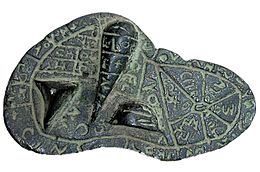Our website is made possible by displaying online advertisements to our visitors.
Please consider supporting us by disabling your ad blocker.
Haruspex

| Part of a series on |
| Anthropology of religion |
|---|
 |
| Social and cultural anthropology |
In the religion of ancient Rome, a haruspex[a] was a person trained to practise a form of divination called haruspicy,[b] the inspection of the entrails[c] of sacrificed animals, especially the livers of sacrificed sheep and poultry. Various ancient cultures of the Near East, such as the Babylonians, also read omens specifically from the liver, a practice also known by the Greek term hepatoscopy (also hepatomancy).
The Roman concept is directly derived from Etruscan religion, as one of the three branches of the disciplina Etrusca.
The Latin terms haruspex and haruspicina are from an archaic word, hīra = "entrails, intestines" (cognate with hernia = "protruding viscera" and hira = "empty gut"; PIE *ǵʰer-) and from the root spec- = "to watch, observe". The Greek ἡπατοσκοπία hēpatoskōpia is from hēpar = "liver" and skop- = "to examine".
Cite error: There are <ref group=lower-alpha> tags or {{efn}} templates on this page, but the references will not show without a {{reflist|group=lower-alpha}} template or {{notelist}} template (see the help page).
Previous Page Next Page


